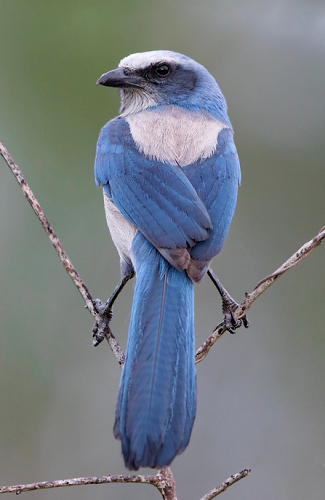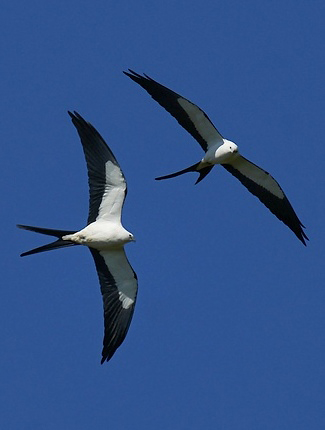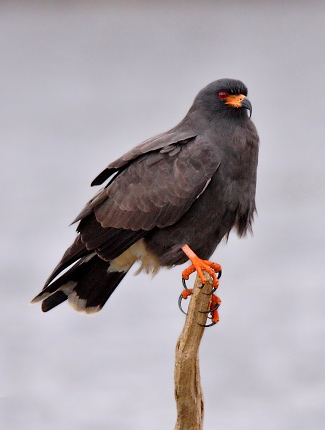

Florida Scrub-jay by Dubi Shapiro.
- Some of North America’s and the world’s most spectacular localized birds including Snail Kite, Short-tailed Hawk, Red-cockaded Woodpecker and the endemic Florida Scrub-jay
- And some of North America's and the world's other most spectacular birds, such as Bald Eagle, Magnificent Frigatebird, Sandhill Crane, Swallow-tailed Kite, Blue Jay, Red-headed Woodpecker and Cedar Waxwing
- With large numbers of confiding waterbirds, especially herons, egrets, ibises and spoonbills, but also including Wood Stork, American White and Brown Pelicans, Anhinga, Osprey, Limpkin, Purple Gallinule and Black Skimmer
- As well as West Indian Manatee
- And other animals such as American Alligator
- The Dry Tortugas, 113 km (70 miles) west of Florida, are accessible on day trips from Key West. Seabirds present here but not on the mainland include Brown and Masked Boobies (the latter at its only nesting site in the United States on Hospital Key), Bridled and Sooty Terns, and Brown Noddy, and during the northern spring this is also a top spot for migrants, especially warblers.
- The annual Florida Keys Birding and Wildlife Festival usually takes place in September during the Florida Keys Hawkwatch which is normally conducted between mid-September and mid-November at Curry Hammock State Park where it averages over 15,000 raptors on their southbound migration, mainly Turkey Vultures and Broad-winged Hawks but also including Swallow-tailed Kites and Short-tailed Hawks. During the 2012 season an incredible 3817 Peregrines were recorded by the end of October including a record 651 on 10th October. See Florida Keys Hawkwatch for more details.
Best Birds and other wildlife in Florida
Birds
Bald Eagle, Magnificent Frigatebird, Sandhill Crane, (American) Swallow-tailed Kite (summer only), Blue and
Florida Scrub Jays, Red-headed and Red-cockaded Woodpeckers, Cedar Waxwing, Reddish Egret, Limpkin, Black Skimmer, localized species such as
Wood Stork, Snail Kite, Short-tailed Hawk, White-crowned Pigeon, Antillean Nighthawk (summer only), Grey Kingbird (summer only), Black-whiskered
Vireo (summer only), Bachman’s and (Cape Sable) Seaside Sparrows, and Shiny Cowbird, as well as Mottled Duck, Wild Turkey, American White and
Brown Pelicans, Anhinga, Black-crowned and Yellow-crowned Night Herons, Green, Great Blue (including intermediate (Wurdemann’s Heron) and white
morphs), Little Blue and Tricoloured Herons, Least Bittern, Glossy and White Ibises, Roseate Spoonbill, (American) Black and Turkey Vultures,
Osprey, Red-shouldered Hawk, Crested Caracara, Sora, Purple Gallinule, Killdeer, Black-necked Stilt and other shorebirds (especially in winter,
including Piping Plover), Laughing Gull, Caspian, Least and Royal Terns, Yellow-billed Cuckoo, Barred and Burrowing Owls, Common Nighthawk (summer
only), Chuck-will’s-widow, Eastern Whip-poor-will (winter), Belted Kingfisher, Pileated Woodpecker, Great Crested Flycatcher, Loggerhead Shrike,
Fish Crow, Cave Swallow, Tufted Tit, Brown-headed Nuthatch,
Blue-grey Gnatcatcher, Eastern Bluebird, Northern Mockingbird, Brown Thrasher, Northern Parula, Pine, Prairie and Yellow-throated Warblers, Common
Yellowthroat, Eastern Towhee, Northern Cardinal, Eastern Meadowlark, Red-winged Blackbird and Boat-tailed Grackle. Wintering and passage migrant
species which may linger into or pass through in April include Ruby-throated Hummingbird, Blue-headed Vireo, American Robin, Black-and-white,
Black-throated Blue, Black-throated Green, Blackpoll, Cape May and Magnolia Warblers, American Redstart, Ovenbird, Scarlet and Summer Tanagers,
Indigo and Painted Buntings, and Baltimore Oriole. Also a chance of Wood Duck, Northern Bobwhite, American Avocet, Mangrove Cuckoo and Yellow
(Golden) Warbler. Escaped and introduced species include several parakeets and Whooping Crane.
Mammals
West Indian Manatee and (Atlantic) Bottlenose Dolphin. Also a chance of Racoon, Nine-banded Armadillo
and River Otter.
Reptiles, Amphibians and Fish
American Alligator, turtles and Green Anole. Also a chance of American Crocodile.
Invertebrates
Butterflies include Julia and Zebra Heliconians, and several swallowtails.
Best Sites for Birds and other wildlife in Florida
- From Orlando
- Blue Spring SP West Indian Manatee (mostly in winter).
- Crystal and Homosassa Rivers West Indian Manatee. It is possible to swim with these at Three Sisters Spring on the Crystal River.
- Merritt Island NWR Numerous waterbirds especially in winter, and Florida Scrub Jay.
- Lake Kissimmee Bald Eagle, Sandhill Crane and Snail Kite.
- Three Lakes WMA Bald Eagle, Sandhill Crane, Red-cockaded Woodpecker, Eastern Bluebird and Bachman's Sparrow.
- Babcock-Webb WMA Sandhill Crane, Red-cockaded Woodpecker, Brown-headed Nuthatch, Pine Warbler and Bachman's Sparrow.
- J.N. "Ding" Darling NWR on Sanibel Island Magnificent Frigatebird, Reddish Egret, Black Skimmer and many other waterbirds. Also a chance of Mangrove Cuckoo.
- Oscar Scherer SP, near Fort Myers Florida Scrub-jay.
- Harns Marsh Preserve, near Fort Myers Snail and Swallow-tailed Kites, and Limpkin.
- (Old) Venus Area including Flatwoods Preserve Florida Scrub-jay, Red-headed Woodpecker, Eastern Bluebird and Bachman’s Sparrow.
- Clewiston Black Skimmer.
- Corkscrew Swamp Sanctuary Swallow-tailed Kite, Wood Stork, Barred Owl and Brown-headed Nuthatch.
- Naples Area Red-cockaded Woodpecker.
- Tigertail Beach/Marco Island Magnificent Frigatebird, Black Skimmer and shorebirds including a chance of Piping Plover.
- Tamiami Trail Snail Kite.
- Wakodahatchee Wetlands Numerous and confiding waterbirds including Least Bittern.
- Cutler Ridge Cave Swallow.
- Everglades NP Numerous waterbirds, Eastern Screech Owl, Barred Owl, Eastern Whip-poor-will (winter) and a chance of American Crocodile.
- Key Biscayne, Miami Piping Plover (winter).
- The Keys Magnificent Frigatebird, Antillean Nighthawk, White-crowned Pigeon, Grey Kingbird and Black-whiskered Vireo. Also a chance of Mangrove Cuckoo.

Two Swallow-tailed Kites in the Everglades by Dave Irving.

Snail Kite by Tom Tams. Florida is the only place in the United States where this great bird occurs. It feeds by snatching water snails from marsh vegetation in flight.
Best Times for Birds and other wildlife in Florida
April is arguably the best time to visit Florida, especially the second half of the month since this is the peak time for passage migrants. Summer visitors such as Swallow-tailed Kite, Antillean Nighthawk, Grey Kingbird and Black-whiskered Vireo have usually arrived by the middle of the month but many winter visitors have usually left by then (having arrived by mid-November). During the northern summer a visit to the Everglades is likely to be remembered more for the mosquitoes than any other wildlife. During the northern winter, the dry season, February is usually the best time to see concentrations of waterbirds in the remaining waters of the Everglades.
Recommended Bird Books etc. for Florida
Traveller's Wildlife Guide: Florida by F and M Sunquist, and L Beletsky. Arris Books, 2007.
Field Guide to the Birds of North America edited by J Dunn and J Alderfer. NGS, 2017 (Seventh Edition).
Kaufman Field Guide to Birds of North America by K Kaufman. Houghton Mifflin, 2005.
The North American Bird Guide by D Sibley. Helm, 2014 (Second Edition).
Peterson Field Guide to Birds of Eastern and Central North America by R T Peterson. Houghton Mifflin, 2010 (Sixth Edition).
The Crossley ID Guide: Eastern Birds by R Crossley. PUP, 2011.
A Birder's Guide to Florida by W Pranty. ABA, 2005 (Fifth Edition reprint).
Mammals of North America by R W Kays and D E Wilson. PUP, 2009 (Second Edition).
Mammals of North America by F A Reid. Peterson North American Field Guides, 2006 (Fourth Edition).
Peterson Field Guide to Finding Mammals in North America by V Dinets. Houghton Mifflin, 2015.
Butterflies of the Caribbean and Florida by P Stiling. Macmillan Caribbean, 1999.
Kaufman Field Guide to Butterflies of North America by J Brock and K Kaufman. Houghton Mifflin, 2003.
Apps etc.
National Geographic Birds: Field Guide to North America.
The Sibley eGuide to the Birds of North America.
Peterson Birds of North America.
Audubon Birds - A Field Guide to North American Birds.
iBird Ultimate Guide to Birds.
Birding and Wildlife Trip Reports for Florida
Many trip reports, some for Florida, are posted on the websites listed here. On some of these websites some reports are independent and some are posted by tour companies who organize tours to Florida. These tour companies and others also post their own reports on their websites, which are listed under 'Some Organized Tours to Florida' below.
- The best website for trip reports is CloudBirders
- but these are also worth a look
- Birdtours
- Fatbirder
- Jon Hornbuckle
- Mammal Watching
Local bird and wildlife guides in Florida
The costs of organized tours partly reflect the quality of the tour leaders. Some leaders are certainly better than others and many companies claim their leaders are the best but even the best rely at least to some extent on the exceptional skills of the local guides they employ. If you are travelling independently, employing such local guides will greatly increase your chances of seeing the wildlife you wish to see.
Accommodation for birders in Florida
Some Organized Tours for birds and other wildlife to Florida
There are many tour companies who organize tours to see mammals, birds, other wildlife and other natural wonders. The cost of these tours vary considerably according to such variables as the airlines used, the number of days the tours last, the number of sites visited, the number of people in the group (an important consideration if you wish to see such wildlife as rainforest mammals and birds), the number of tour leaders, the standard of accommodation and transport, and the percentage profit the company hopes to make. Generally, where the number of days tours last and the number of sites visited are similar, the cheapest tours are those that use the cheapest airlines, accommodation and local transport, that have the largest groups with the least number of leaders, and that make the least amount of profit. The most expensive tours tend to be those which are exceptionally long, use the most expensive accommodation (ridiculously lavish in some cases, even for single nights) and which make the most profit. Some tour costs partly reflect the quality of the tour leaders. Some leaders are certainly better than others and many companies claim their leaders are the best but even the best rely at least to some extent on the exceptional skills of the local guides they employ.
While tour companies organize tours with set itineraries many also organize custom tours for individuals and private groups who instead of taking a tour with a set itinerary want to follow their own itinerary to suit their own personal tastes, whether it be mammals, birds, other wildlife, other natural wonders or even man-made attractions, or a mixture of them all. Many organized tours with set itineraries are also fast-paced and target as many species as possible, whether they are mammals, birds or other wildlife or everything, which usually leaves little time to enjoy the best sites and individual species, but on a custom tour those taking part can specify the pace and the sites and species they wish to concentrate on. Custom tours also suit people who like to travel with people they already know, rather than with a group of strangers, and people with partners with different interests. Individuals and small groups will almost certainly have to pay more than the price of an organized tour with a set itinerary but a large group of friends may be able to travel for less than the price quoted for a set tour.
Tour companies who are running organized tours to Florida in the next couple of years include the following. Many of these also offer custom tours.
